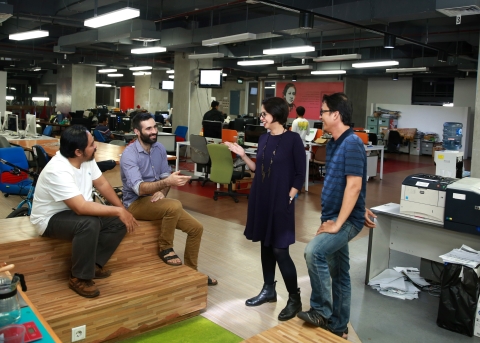
A pioneering team at Tempo Media Group, one of Indonesia’s largest media houses, is embracing digital storytelling in a big way. Its interactive multimedia investigations are captivating readers by exposing everything from corruption to illegal drug trafficking.
With support from International Center for Journalists (ICFJ) Knight Fellow Antoine Laurent, Tempo launched the six-person Medialab team last year and reimagined how it tells stories online. In the past, Tempo shared investigations online up to a week after the print publication published them. Text and photos were uploaded as PDFs.
No more. Tempo’s digital stories now break news, and the media giant’s toolbox now includes 360-degree photography, interactive maps, embedded videos, clickable timelines and more.
The investment in digital storytelling is paying off. One of the Medialab’s first stories—an investigation revealing a fake PhD scam, rich with photos and data visualizations—quickly garnered one of the highest page views in Tempo’s history. Thousands of readers shared the story on social media, and employees at the state university were suspended for their involvement in the scheme.
“I think users feel they get more information and understanding from an interactive story than a plain regular story,” said Tempo editor Wahyu Dhyatmika. He noted that even before a planned marketing campaign, 500 to 700 new readers every month had been signing up for digital subscriptions. “We are now in the process of expanding the Medialab,” said Dhyatmika.
The team’s recent projects and their impact include:
-
A multimedia investigation that showed how local officials were profiting from illegally selling land permits to palm oil companies. After the story broke, Indonesia’s anti-corruption commission arrested several district heads.
-
An interactive map of nightclubs in Jakarta where illegal prostitution and drug trafficking run rampant. Soon after publication, Governor Anies Baswedan prosecuted and closed all of the nightclubs mentioned in the article.
-
An illustrated long-form story about an unsolved acid attack more than a year ago that partially blinded a top anti-corruption investigator. After publication, the police committed to greater action on the case.
To make the transformation, ICFJ Knight Fellow Laurent focused on beefing up the skills of the infographics team rather than push the entire newsroom to learn digital storytelling tools.
“It’s quite unfair to tell someone who is not digitally savvy to change quickly,” said Laurent, an innovation strategist and former journalist, who drew on his experience supporting digital transformation in French media as the former director of the Fonds Pour l’innovation Numérique de la Presse.
During his tenure as a Knight Fellow, which ended in July, Laurent also worked with KBR68H, Indonesia’s only independent national radio news agency. Like Tempo, KBR68H has expanded its online storytelling by creating a dedicated digital storytelling team. KBR68H’s new team draws on the station’s roots in audio reporting, creating interactives such as this audiogram story.
“Indonesia is such an important country -- it really sets the trends for all of Southeast Asia,” said Patrick Butler, ICFJ’s vice president for programs. “Antoine and his partners are leading the way for the advancement of journalism throughout the region.”
The ICFJ Knight Fellowships instill a culture of news innovation and experimentation worldwide. Fellows help journalists and news organizations adopt new technologies to enhance their news gathering, storytelling, editorial workflows, audience engagement and business models. The result: sustainable, trustworthy journalism that serves the public interest. Learn more.